Part 117: The Atomic Age – 1948
Chapter 12 — The Atomic Age — December 1944 to January 1948Panic was spreading across Western Europe like a cancer, with news of the atomic bombing of Frankfurt pitching entire nations into mass hysteria as hundreds of thousands of refugees fled westward, as entire families fervently prayed that they would be spared the same fate, as protesters turned out in force to demand an immediate surrender…

That was precisely what the Russians had hoped for when Kuzka’s Mother was dropped on Frankfurt, of course, and they followed up their bombing by sending a dispatch to Qadis — sue for peace, or more bombings would follow.
Supreme Leader Mizanur presented this demand to the Socialist Shura, along with the fact that Iberia was mere days away from completing its own atomic bomb. Armed with this knowledge, the ministers of the assembly dismissed any notions of surrender, instead authorising the Supreme Leader to wage a war of the likes never seen before — a nuclear war.

Until the first bomb completed construction, however, there were other questions that needed settling. Namely, the fate of the territories of the Frankish Realm.
Supreme Leader Mizanur immediately announced that all lands up to the River Garonne would be annexed, giving the Red Army a convenient base from which to operate across Europe. As for the rest of Francia, a number of different plans were drawn up for consideration by the Socialist Shura, but the assembly eventually decided to implement the most extreme of them — the eight state solution, whereby the Frankish Realm would be partitioned into eight “workers’ republics” that were little more than rump states, ensuring that they could never again challenge the hegemony of Iberia.









The Italian peninsula was spared the same fate, with the assembly instead opting to simply install communism in both Italy and Palermo, but only after completely dissolving the Papal States and annexing Sicily and Sardinia into Iberia.


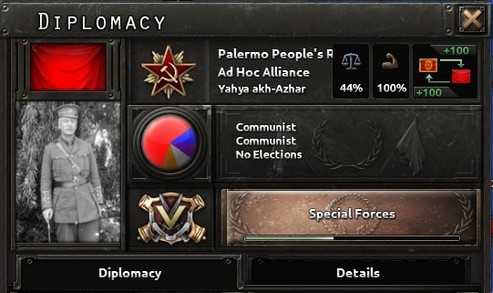
In the dying days of January, meanwhile, Iberia’s first atomic bomb was finally completed.
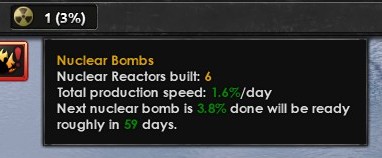
Dubbed Qisās — “eye for an eye” — Mizanur wasted no time in deploying the weapon, and after hundreds of warplanes were scrambled across Poland, a strategic bomber slipped through the lines and dropped the atomic bomb on Cottbus.
A brilliant flash and an earsplitting boom, and tens of thousands perished instantly, with thousands more injured and dying as the blast swept across the city.

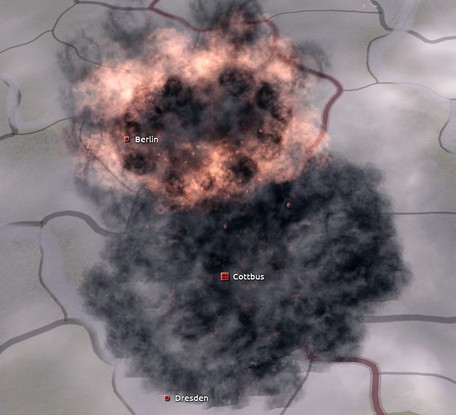
An eye for an eye, and Iberia finally showed her hand. Vicious clashes immediately erupted along the frontlines as both sides ordered offensives, but behind the scenes, Iberian and Russian scientists were working around the clock to construct more bombs. The atom would decide this war, they were certain.

The same was happening at the Suez, of course, but there the Iberians suffered a crushing defeat and were forced to retreat.
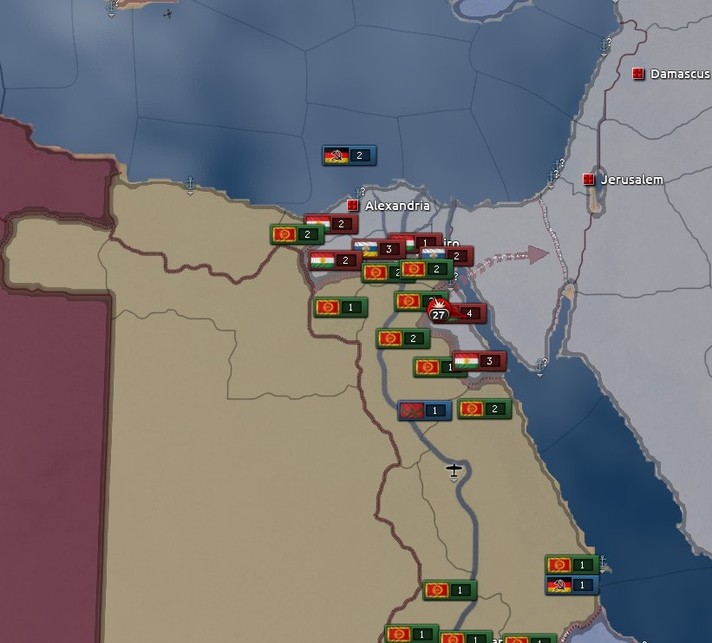
The situation quickly became critical and, after receiving authorisation from Qadis, the leading marshal Tiqnu al-Dhib took control over the forces of the Maghrebi Workers’ Republic. Almost 300,000 Moroccans, Algerians and Tunisians began the march towards Egypt in the scorching summer of 1945, where Tiqnu al-Dhib desperately tried to maintain his lines.
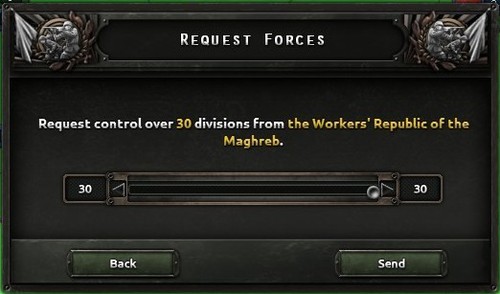
To the east, meanwhile, the Bengal Raj and Almoravid Sultanate were still battling over the southern tip of India. Every day seemed bloodier than the last, but a clever naval invasion finally tipped the fight in favour of the Bengali, circumventing Almoravid lines and allowing them to besiege Madras.
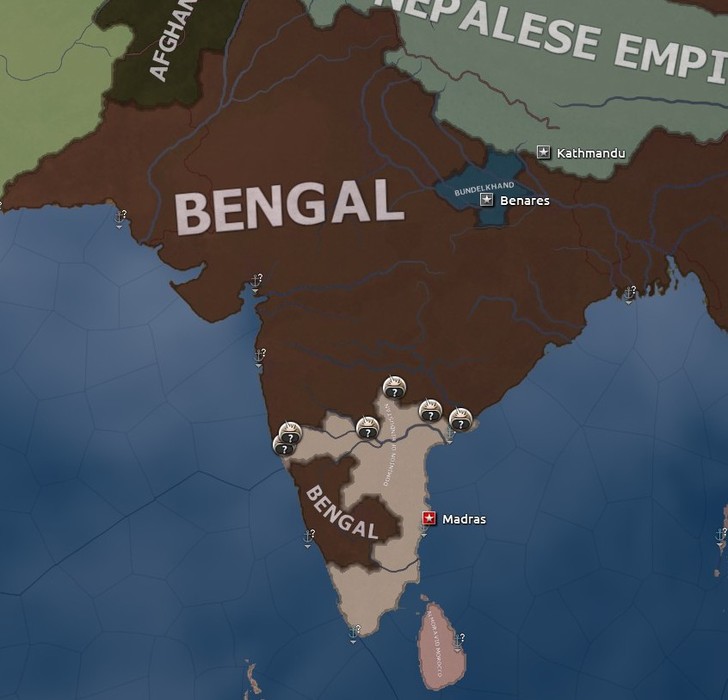
At the same time, sheer numbers allowed the Manchu to finally overwhelm the defensive lines along the Amrok River and flood into the Korean peninsula, forcing the Red Turbans to withdraw further south.
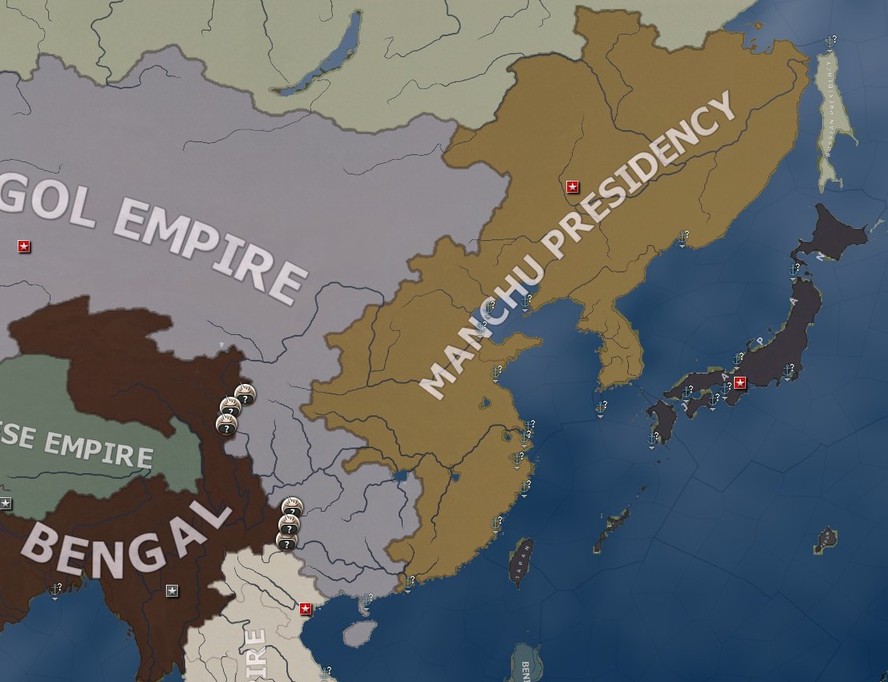
Across the Pacific Ocean, the stalemate in Gharbia finally came to an end. Berber Union and New England were evenly-matched in technology and industry, but in terms of warm bodies to throw onto the battlefield, the Berbers were unparalleled.
And it was this immense manpower that allowed them to flood enemy lines and force breaches, reaching the Mississippi River in October of 1945.
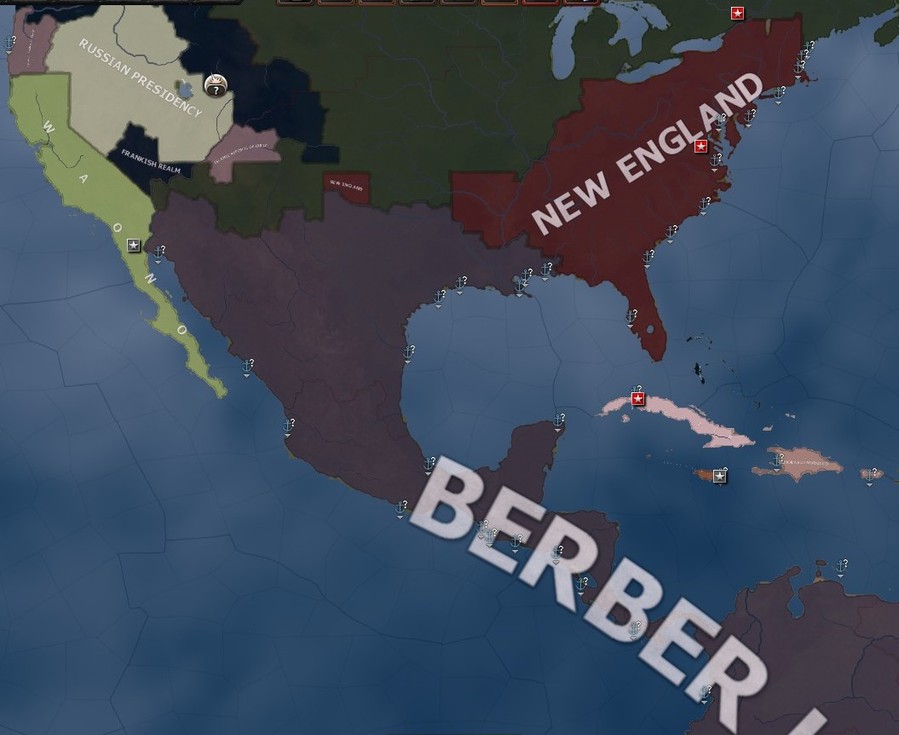
Back in Europe, meanwhile, the war was already reaching boiling point. Iberia and Russia were relentlessly producing nuclear bombs, but it seems as though the latter had an edge in reactors, because they lit the skies above Venice and Amsterdam afire in the dying days of December.
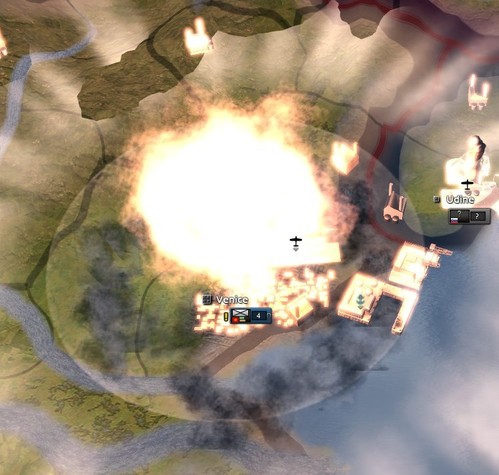
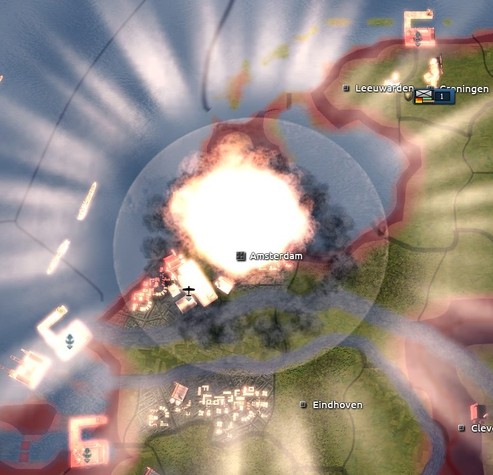
It was quickly becoming clear that the Russians were purposely targeting major population centres, determined to force the Iberians onto the negotiation table by breaking their will to fight.
Mizanur refused to answer to atomic diplomacy, of course, but he had only one bomb at his disposal. With the largest cities in Italy and Benelux in flames, however, there had to be some retaliation, so the Supreme Leader immediately began planning his counter-attack.
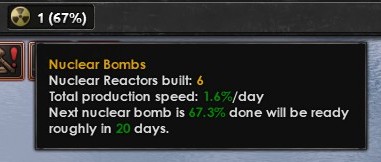
As the spring equinox approached, the Maghrebi divisions levied by the Iberians arrived in Egypt, providing the front with sorely-needed reinforcements.
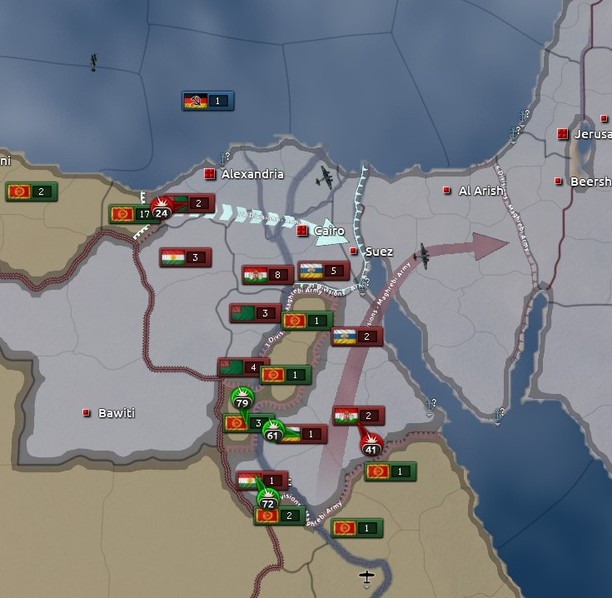
Tiqnu al-Dhib quickly put them to good use, but whilst he was planning his reconquest of Alexandria, the prominent commander was caught in a sudden air raid that blew his legs to smithereens.
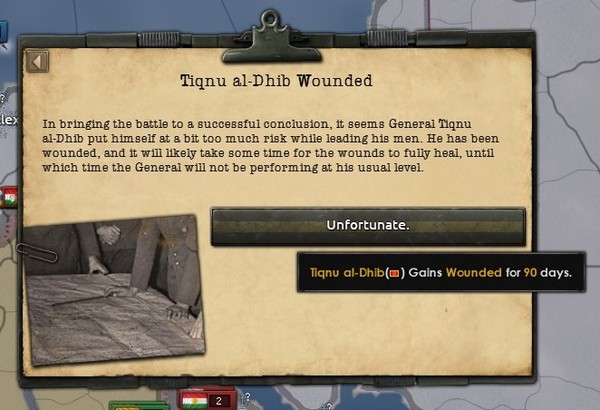
This was just another in a long list of injuries for the commander, but despite being more meat than man, Tiqnu still refused to surrender his command.
Instead, he used his recovery period to launch a vicious counter-attack that rapidly recaptured Alexandria, Damietta and Cairo, surrounding and capturing tens of thousands over the course of June and July.
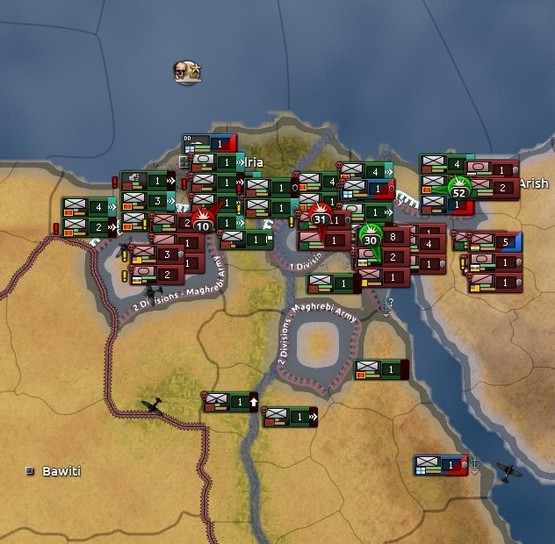
This resurgence in Egypt coincided with a counter-attack in Germany, where the Iberians were finally ready to take the fight to the enemy.
It began with nuclear retaliation, personally supervised by Supreme Leader Mizanur, as atomic bombs were detonated over Erfurt and Magdeburg.
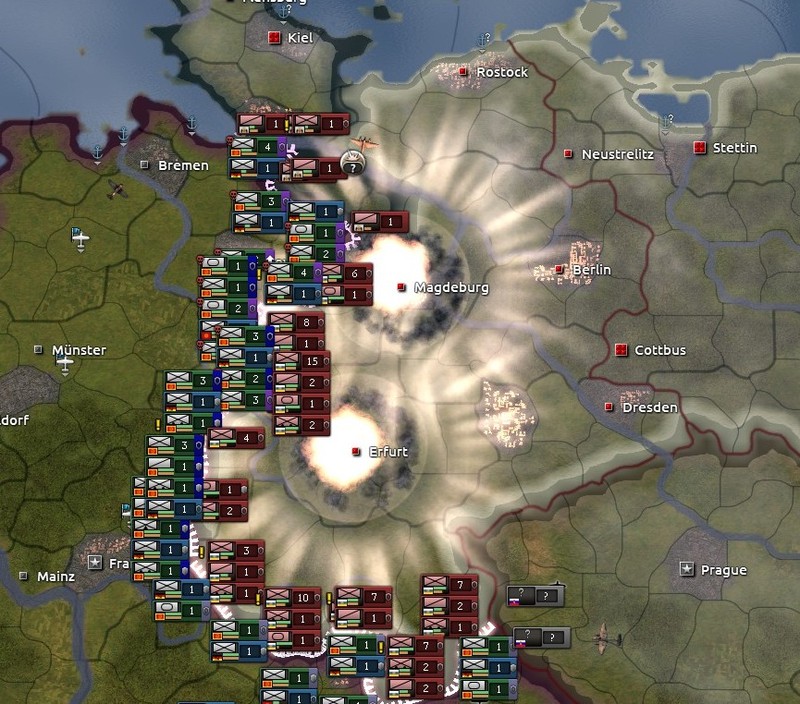
They weren’t particularly large cities, but both Erfurt and Magdeburg were strategically-located regional hubs and supply depots, and the bombings immediately destroyed the infrastructure and railroads that that converged on them.
And even before the shockwaves were felt, Mahmud ibn Bibil gave the order to advance all down the front, with millions of Iberian boots tearing at the ground beneath them as they pushed eastward in strength.
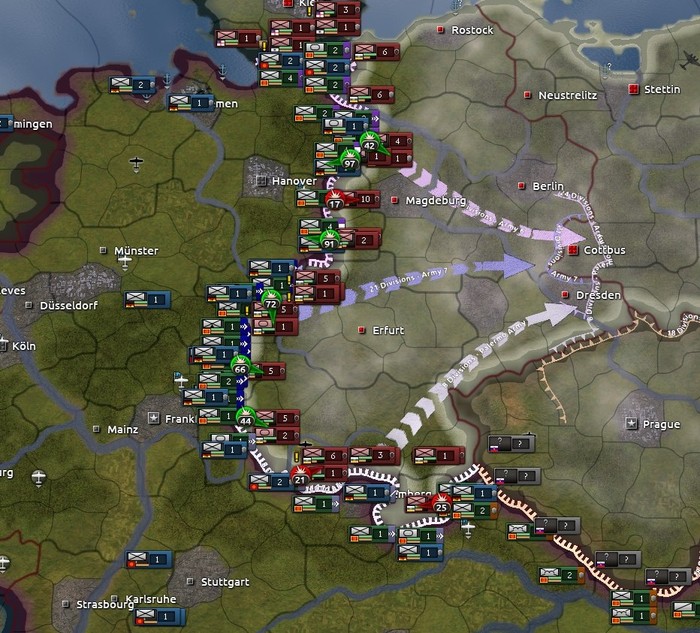
For a few crucial days, the Russian command was utterly paralysed, and a series of armoured offensives allowed the Iberians to encircle almost 380,000 Russians near Bremen and Kassel.
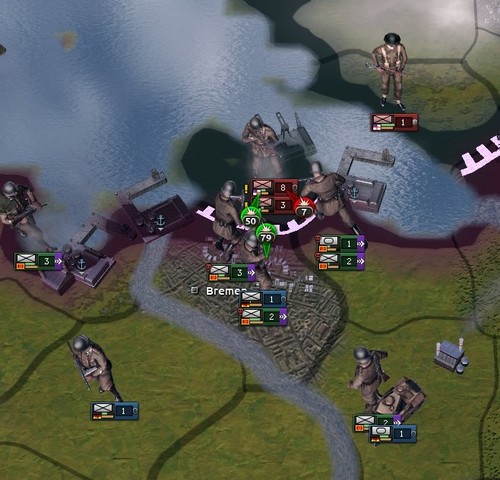
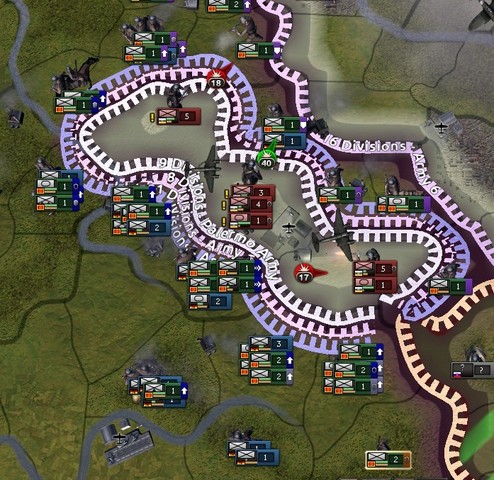
Erfurt and Magdeburg, or what was left of them, were captured a few weeks after the atomic bombings, with the Iberians flooding east en masse. And the Russians could only retreat, desperately evacuating Germany and establishing new defensive positions along the outskirts of Berlin.
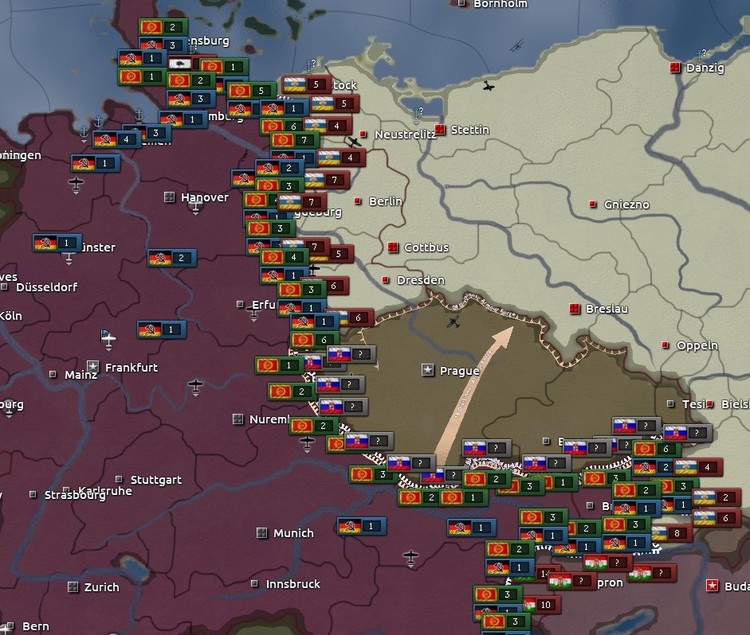
On the African front, Iberian assaults across the Suez had resulted in heavy casualties.

But the Supreme Leader’s orders were to cross the canal, and his orders were law.
So after a string of suicidal offensives and crushing defeats, with tens of thousands of fresh-faced recruits thrown to their deaths in the miry waters of the Suez Canal, Iberian boots finally touched ground in Asia in the early days of September.
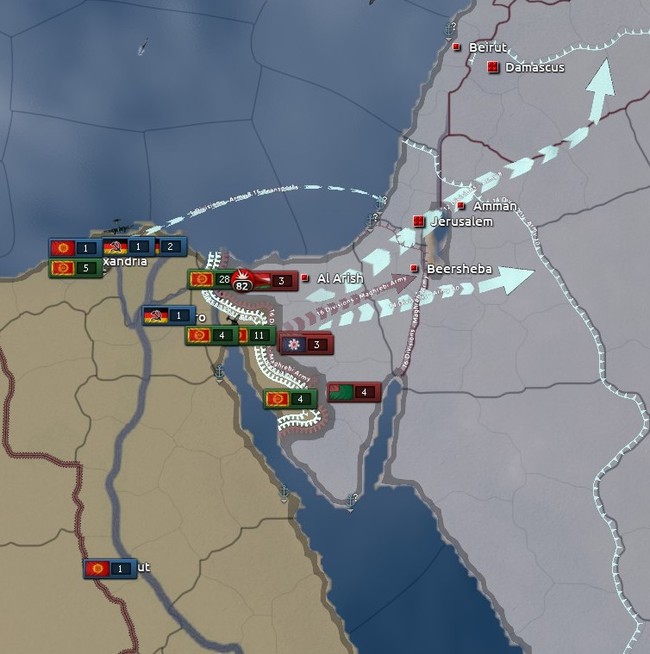
The news was quickly relayed to Qadis, but the high command was already preoccupied by developments in the north, where the Russians had managed to capitulate Scandinavia.
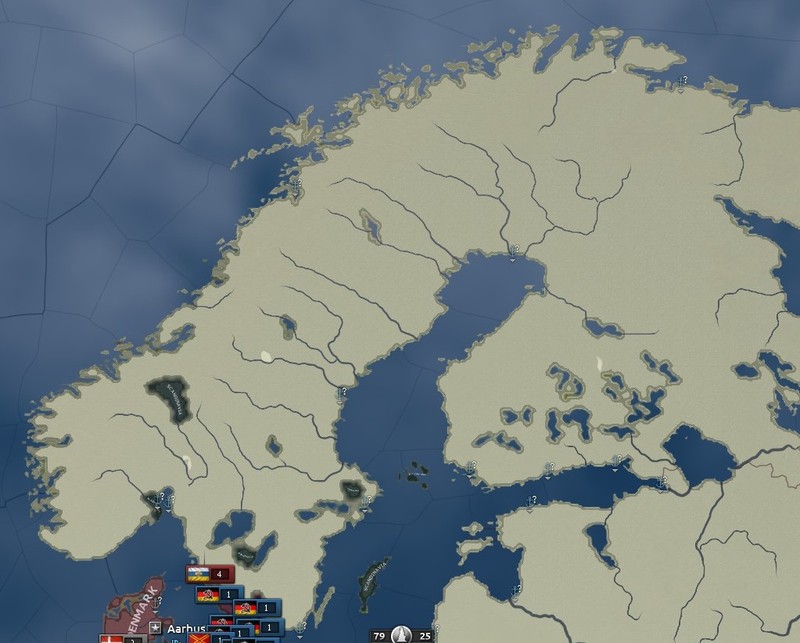
With new bases in the Nordic peninsula, the Russians struck south in November of 1945, using Denmark as a stepping-stone to invade Germany from the north…
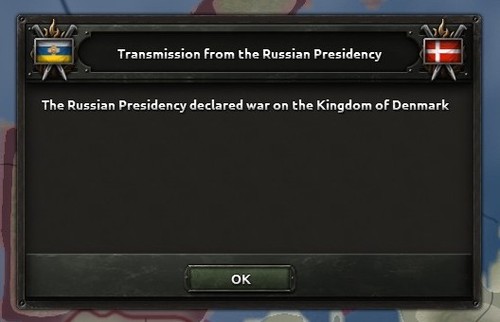
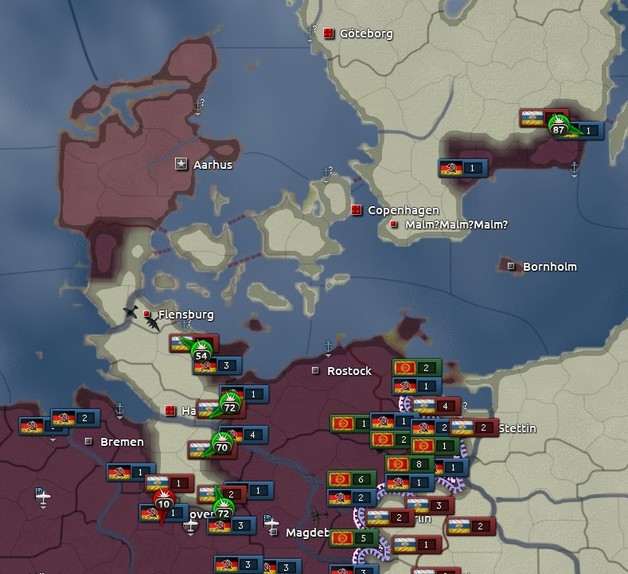
…whilst simultaneously launching a naval invasion that successfully captured Rostock, before swarming southward and threatening both Berlin and Magdeburg.
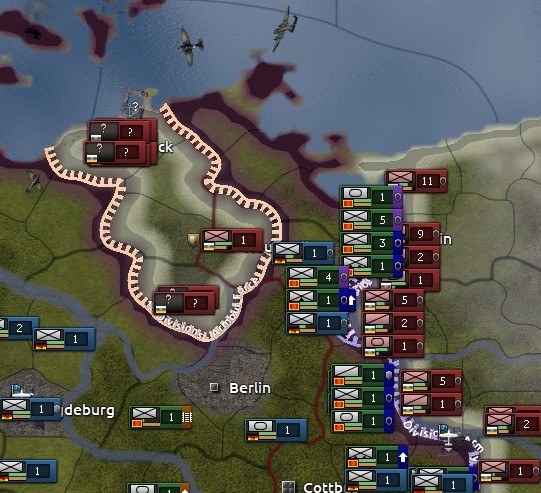
This ambitious invasion by land and sea was a serious threat to northern Germany, and unless the Iberians reacted quickly, they would be pocketed in a massive encirclement before year’s end.
Just as Mahmud ibn Bibil ordered a strategic redeployment, however, the Supreme Leader acted…
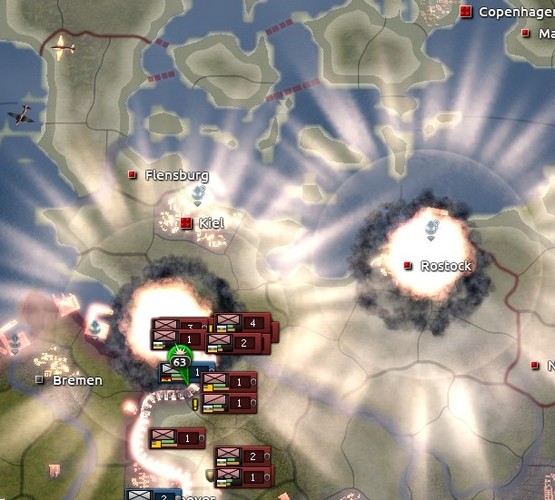
Two atomic bombs were dropped on Hamburg and Rostock, both industrial cities with large populations, both inhabited chiefly by Germans, and both under the nominal protection of Iberia.
Or at least, they were. Only the power of the atom could bring the Russian advance to a halt, and though the German populace immediately erupted into riots and rebellions, the twin bombings allowed the Iberians to redeploy and counter-attack in the early days of 1946, retaking the Jutland peninsula in a determined winter offensive.
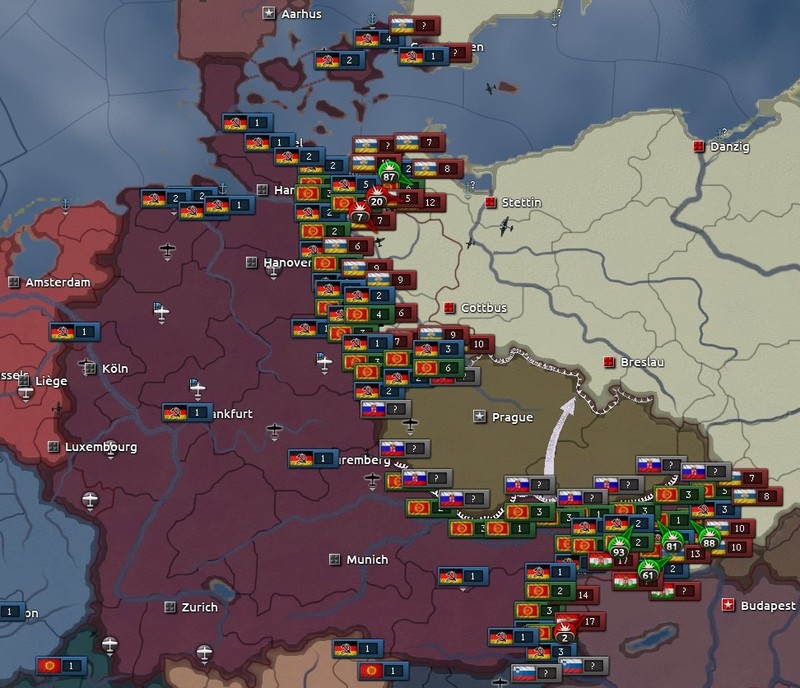
Just as the high command breathed a sigh of relief, however, they were faced with another crisis. Spring of 1946 began with another Russian offensive, but this time further south, with hundreds of thousands of Russians and Hungarians flooding into the Vienna Corridor.
And after bloody fighting stretching across weeks, Vienna finally fell, creating a vulnerable salient that risked another encirclement.
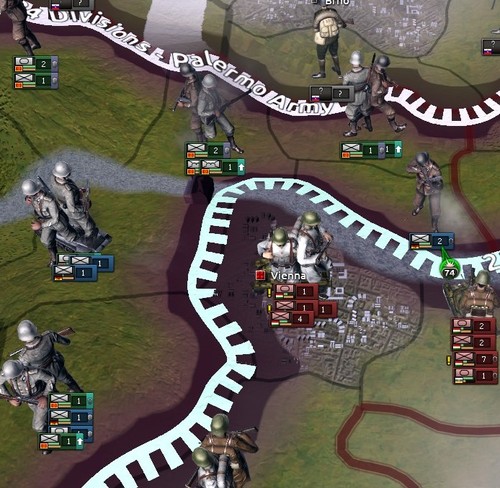
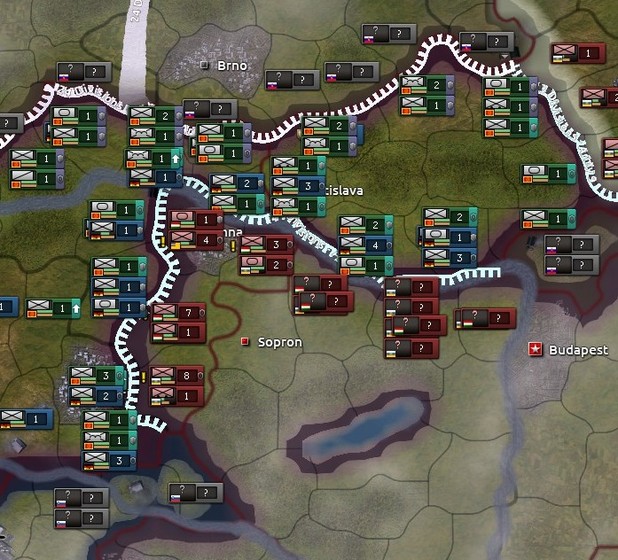
It would be months before the next bombs were completed, so the Supreme Leader couldn’t resort to atomic weaponry this time, forcing Mizanur to instead demand military access through Bohemia.
The strictly-neutral state immediately refused, of course, and the demand became a declaration overnight.
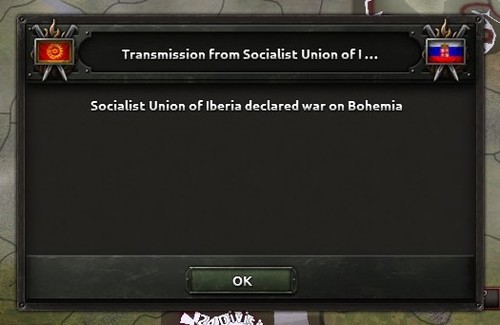

Renowned for their neutrality, the Bohemian army was little more than a volunteer force, a volunteer force that was quickly annihilated as the Red Army swarmed northward in strength, seizing Prague after a scant few days. Unless the Russians did something, the Iberians would be crossing into Poland within the week, risking another encirclement.
That couldn’t be allowed to happen, and just as the Iberians were leaving the city, an atomic bomb was detonated over Prague, killing tens of thousands of soldiers alongside hundreds of thousands of civilians.
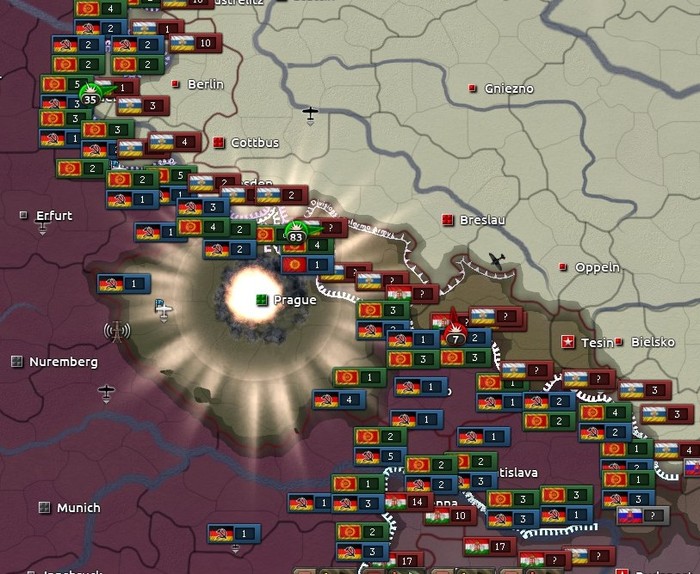
As another flurry of nuclear exchanges leaves Europe reeling, the Berbers continued their march across Gharbia, suffering a relatively-lenient toll in blood and life as they neared the capital of New England — Richmond.
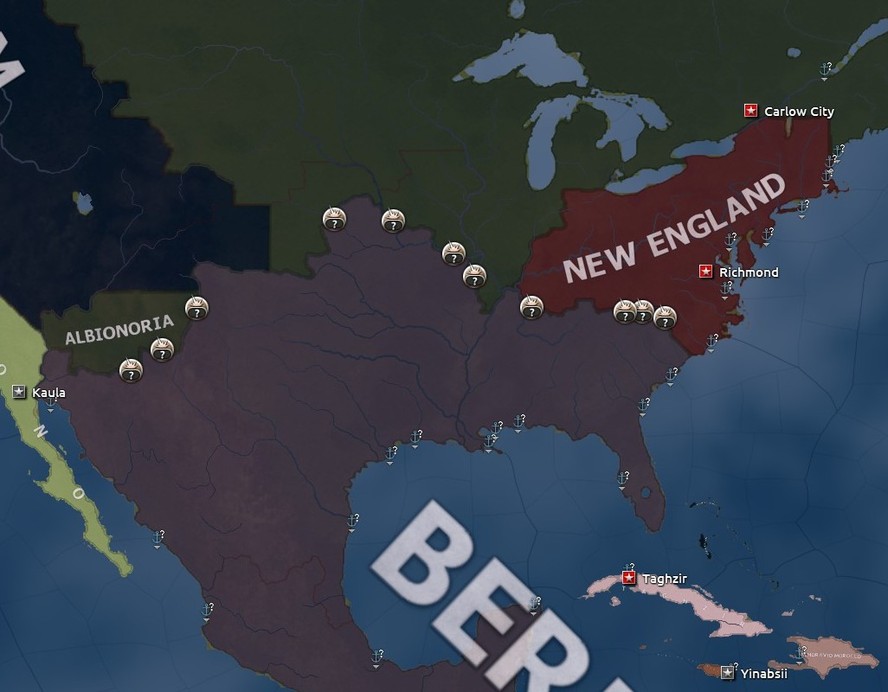
And in India, the Bengali managed to whittle the Almoravids down to a cratered patchwork around Madras, which was being continuously shelled from air and ground alike.

In the Middle East, Tiqnu al-Dhib had coordinated a massive invasion of the Levant over the past year, with a conglomerate force of Iberians, Maghrebi, Egyptians and Germans seizing a string of cities from Arish to Damascus before being forced to a bloody halt in November of 1946.
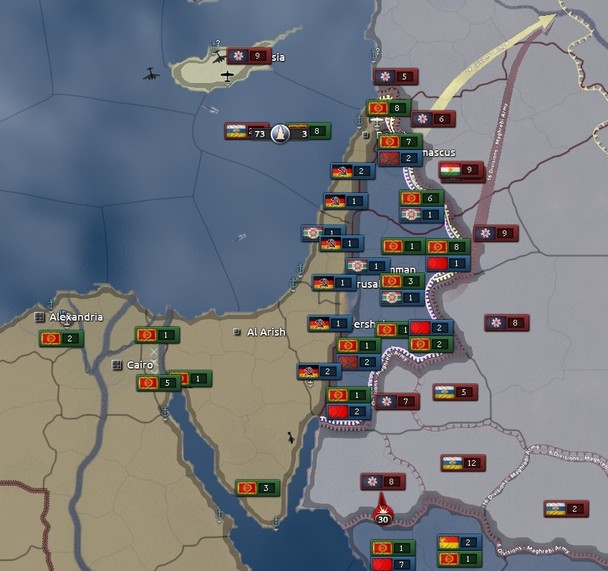
At the same time, a combined Iberian-Egyptian force launched operations southwards, campaigning along the Nile and capturing large tracts of Sudan and Ethiopia, forcing the Apanoub loyalists to flee to their southern colonies.
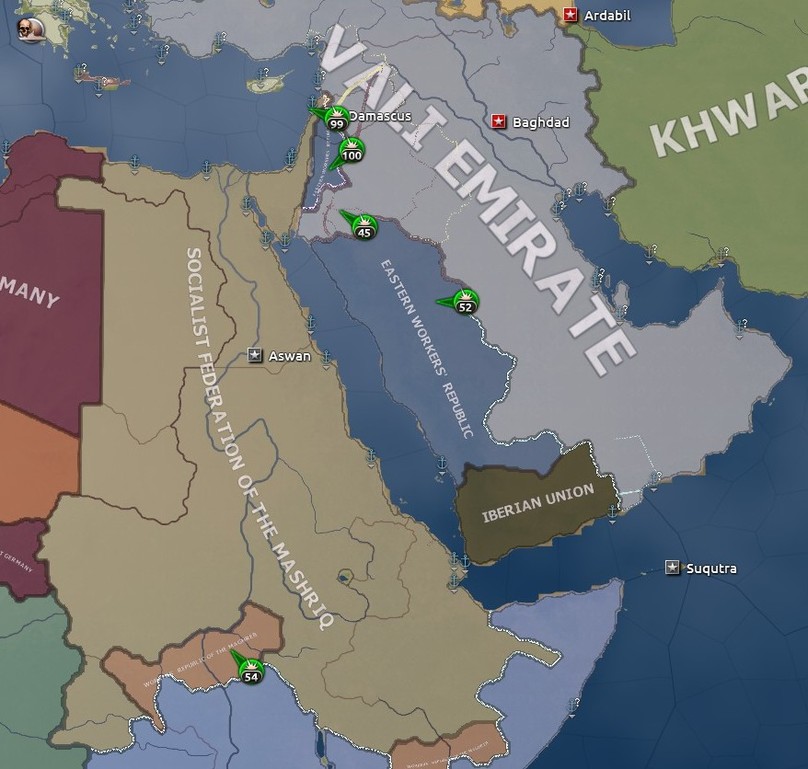
On the home front, a few months of calm settled along the lines, but it wouldn’t much longer before mushroom clouds rose across the continent once more.
The next wave arrived as the year ended, with the Russians making their move just as freezing winds swept across Germany. A sudden onslaught of jet fighters seized those winds in a hardwon air battle, and a few days before Christmas of 1946, three atomic bombs were dropped on Hanover, Nuremberg and Munich.
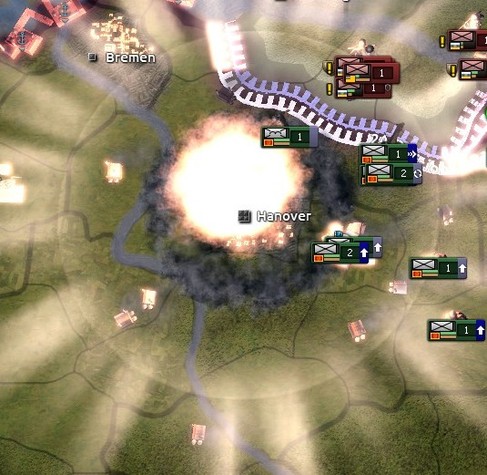
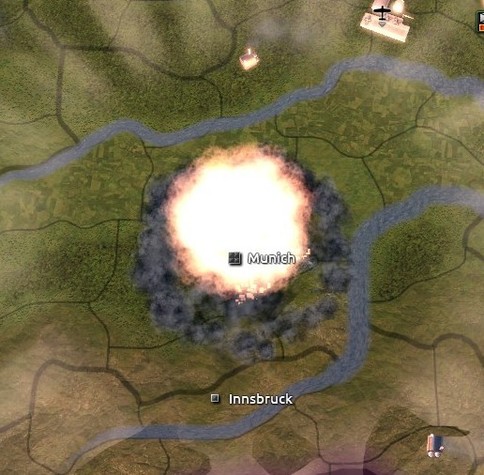
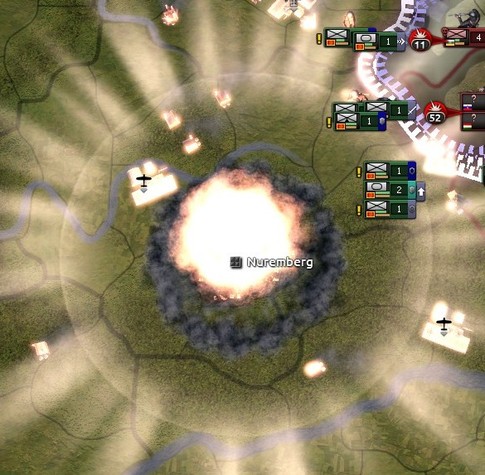
Again, they were likely targeted because they had massive populations, but the bombings also obliterated supply and communication lines, throwing the Iberians into chaos and allowing the Russians to launch a massive westward offensive.
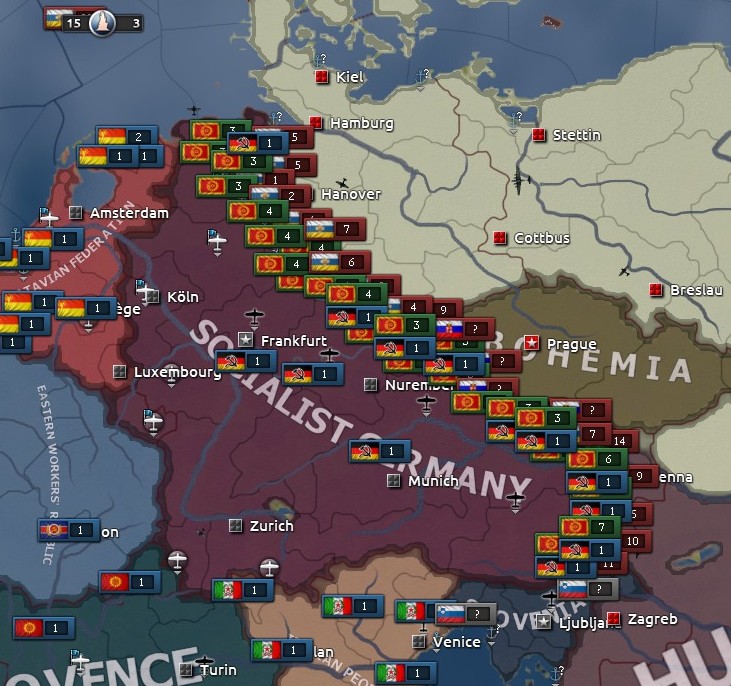
Iberian lines were quickly pushed back, with the Red Army surrendering Hamburg, Hanover, Magdeburg, Erfurt and Prague in quick succession, and it quickly became clear that the Russians could only be stopped with nuclear fire…
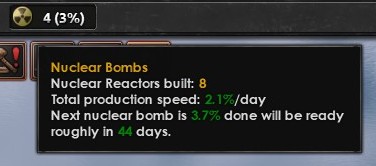
So four targets were selected, four orders were given, four bombs were dropped.
And within a few days of each other, deep into March of 1947, mushroom clouds rose above Lüneburg, Berlin, Prague and Vienna.
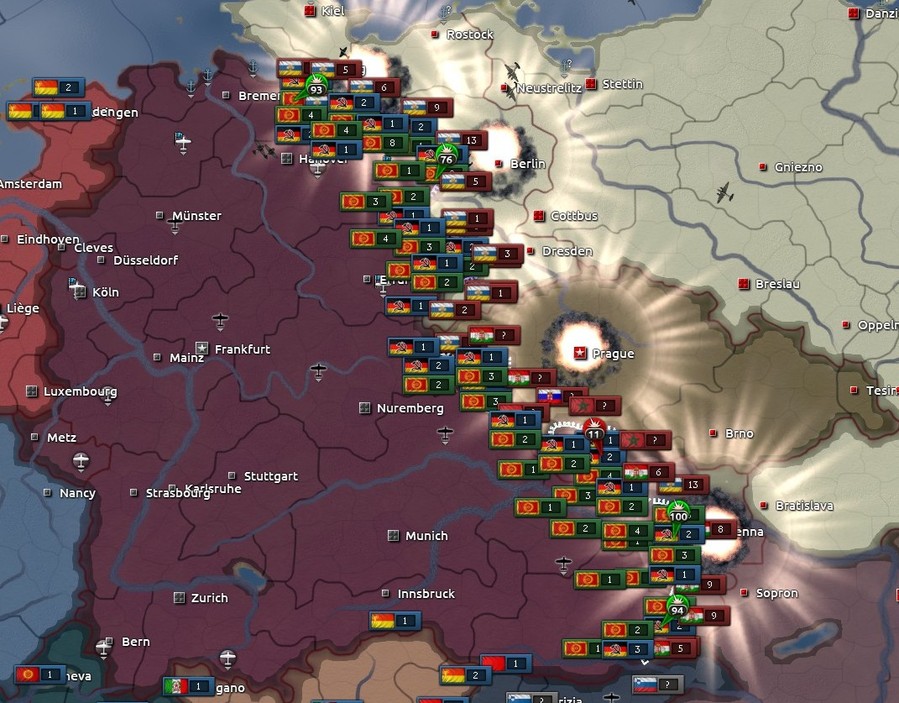
The Russians were certainly brought to a halt, but at the cost of immense destruction and devastation, and the Iberians couldn’t push through the desolate wasteland either.
As both sides were forced to resort to conventional warfare, the Almoravids somehow managed to reinforce their garrison in Madras yet again, retaking the initiative in southern India.
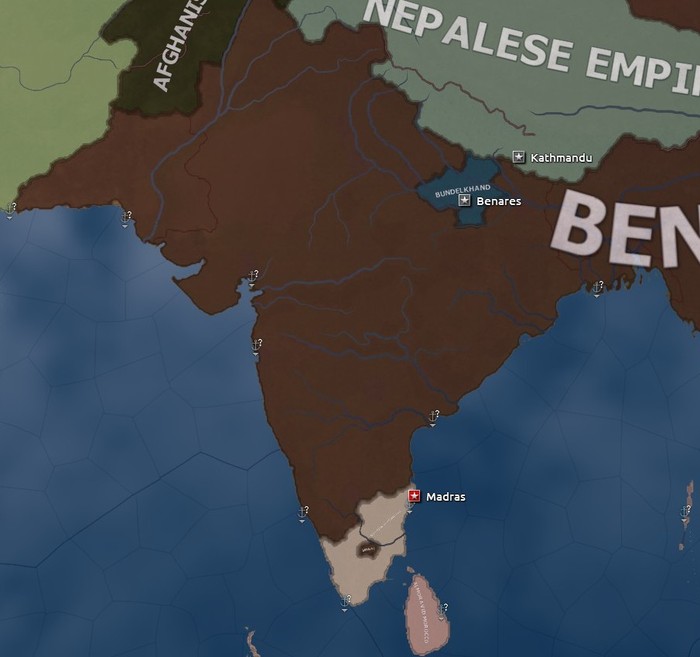
Further east, meanwhile, the Manchu had solidified their control over Korea and forced the Red Turbans to flee the peninsula, systemically purging any remnants of the regime in the months that followed.
And with that, the Manchu president finally declared that his wars were at end, beginning immediate negotiations for peace with the great powers. He also announced his intentions to preserve his conquests as a powerful union of federal republics in Manchuria, China and Korea, giving rise to a new power in Asia.
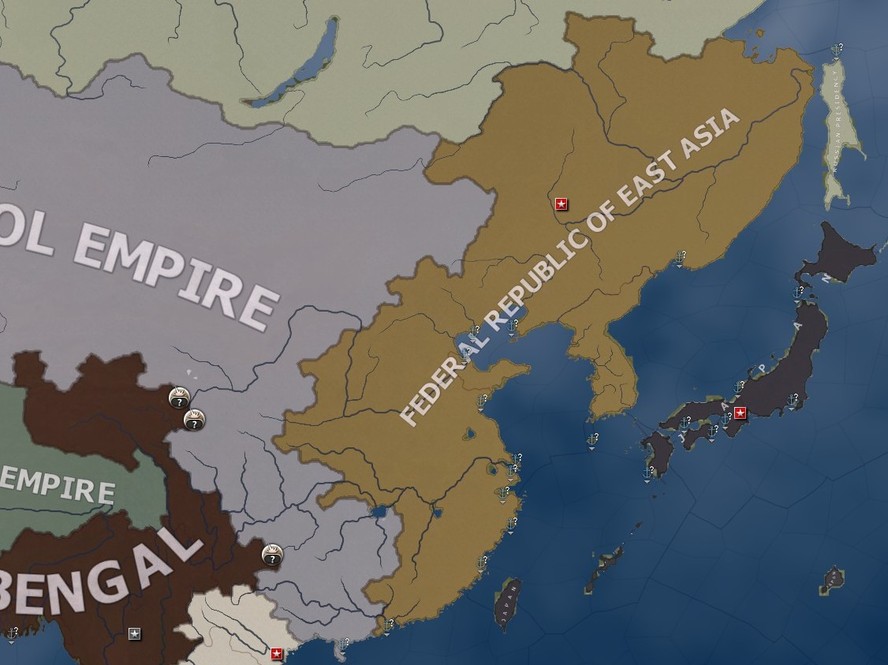
More important, however, was the news that came from the west.
The Berbers had been fighting on the outskirts of Richmond for months now, with the New English doggedly refusing to enter any negotiations until they withdrew west of the Mississippi. The battles raging around the capital had already cost hundreds of thousands of lives, and Richmond wasn’t any closer to capitulating.
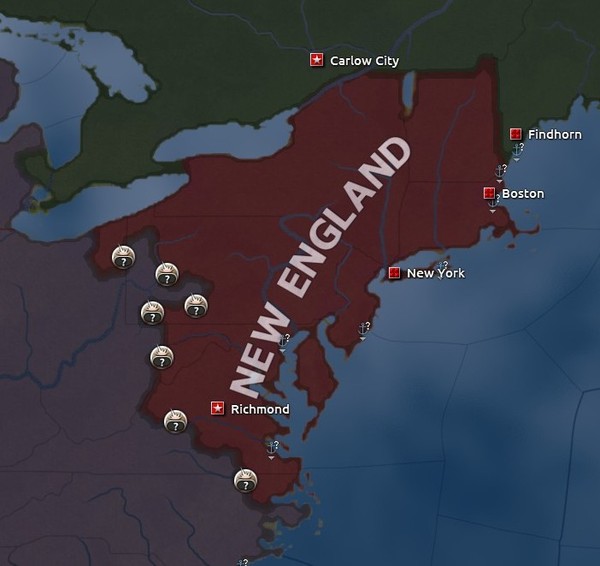
Unfortunately for them, that was precisely the excuse that the Berbers had been waiting for.
A few days after their latest demand was refused, a torrent of warplanes were charged with a routine air raid on New York, but the bomb that they dropped would quickly plunge the entire country into chaos…
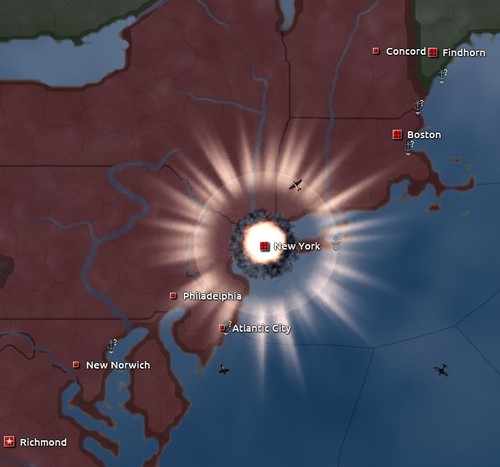
Fearing a nuclear war mimicking the horrifying blows exchanged between Iberia and Russia, the Richmond government promptly surrendered to Imariz, finally ending hostilities in Gharbia.
At long last, the Berber Union was victorious.
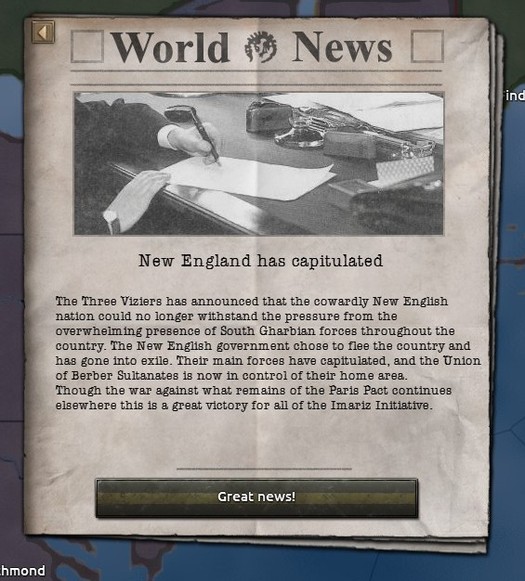
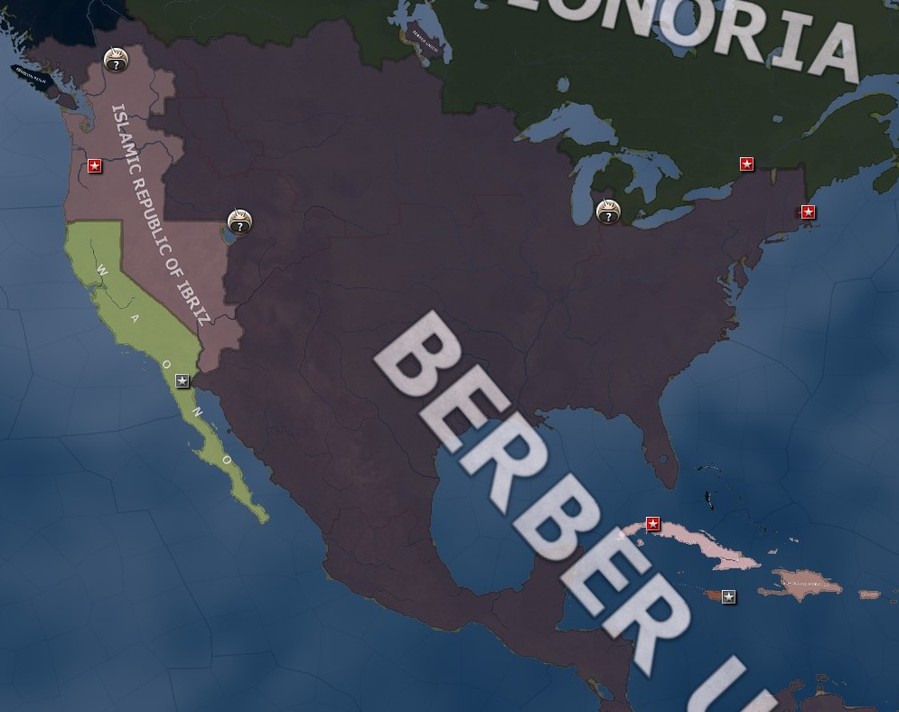
In Europe, meanwhile, fighting continued to rage throughout the winter of 1947. Vast swathes of devastated land and cratered cities made the fighting sparse but bloody, and though several bombs were constructed by both Iberia and Russia over these months, neither side deployed any for fear of retaliation.
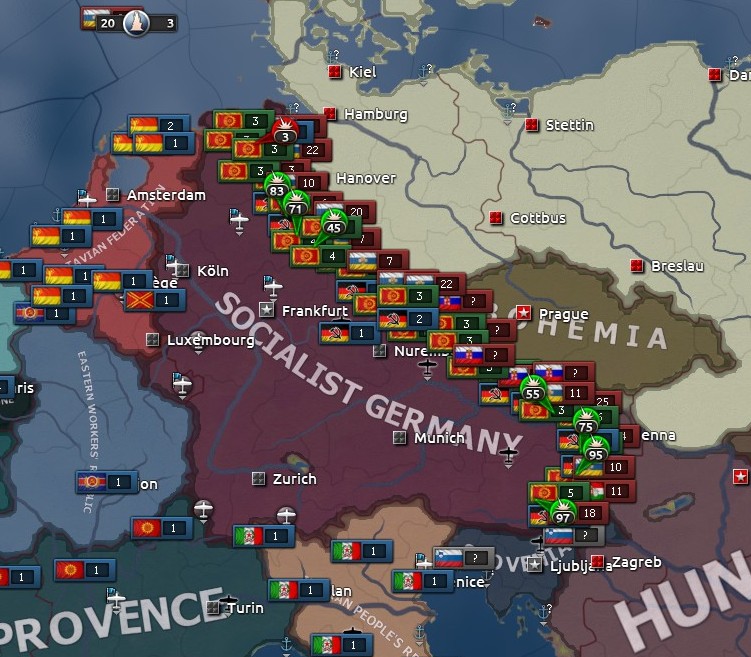
As worries about a nuclear autumn sent waves of panic reverberating across the continent, protesters marched in cities across the width of Europe, demanding an end to the war from Brest to Smolensk.
And despite gaining and losing a few towns here and there, neither side was able to regain the initiative in the early months of 1948. Finally, four years after the first atomic bomb was dropped on Frankfurt, the Supreme Leader of Iberia extended an olive branch to the President of Russia…
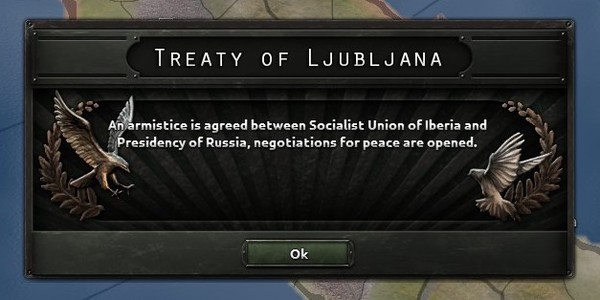
And the world held its breath.